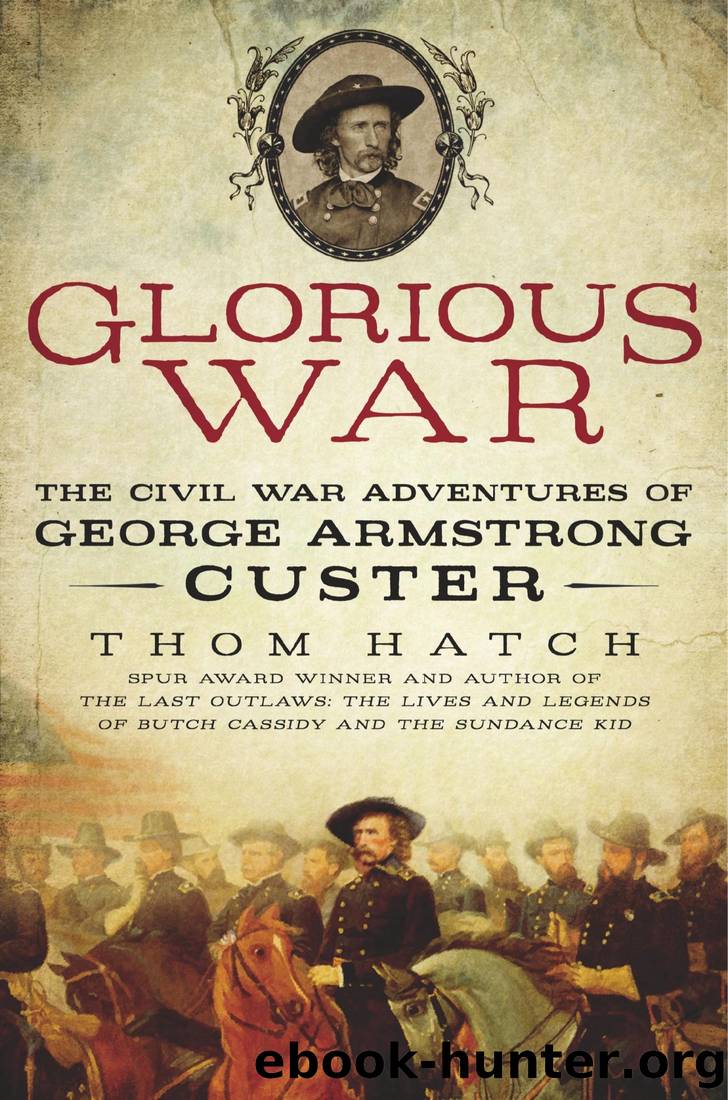Glorious War: The Civil War Adventures of George Armstrong Custer by Thom Hatch

Author:Thom Hatch [Hatch, Thom]
Language: eng
Format: epub
Tags: Autobiography, Biography, Civil War Period (1850-1877), Historical, History, Military, United States
ISBN: 9781250028501
Google: QddWAAAAQBAJ
Amazon: 1250028507
Publisher: St. Martin's Press
Published: 2013-12-10T00:00:00+00:00
Fifteen
Culpeper
Civil War officers were expected to motivate and inspire their troops under fire by example—bravery was contagious. George Armstrong Custer, however, elevated that responsibility to a higher level. While few cavalry generals, if any, would ever consider leading a charge into the enemy at the front of his troops, Custer had made it a practice—and a tactic of proven success.
And by his actions, Custer had proven during the Gettysburg Campaign that contrary to those who had questioned General Alfred Pleasonton’s judgment in promoting the twenty-three-year-old to brigadier general, he was quite capable of commanding a brigade. In addition, he had gained the admiration of his men with his propensity for leading charges rather than simply directing movements from a safe position in the rear. This one distinct trait had instilled within his troops a confidence that if Custer, a general, had the nerve to charge into the blazing guns of the enemy, then there was no reason not to believe that if they followed, victory would be within their grasp.
Custer had demonstrated a special affinity for cavalry tactics. James Kidd told how this general reacted instinctively to the movements of the enemy and the terrain during a battle, and that “his perceptions were intuitions.” Custer had followed the textbook example of deploying his men and seeking intelligence with respect to his enemy’s strength and capabilities before calling for a charge. He had not exhibited the rashness that was a trademark of Kilpatrick, whose disregard for the lives of his troops was well known; rather, he used a more calculated procedure, knowing that at some point in the battle there would likely be an opportunity to strike the enemy’s weak underbelly—and once identified he would charge. Custer certainly believed that cavalry tactics required boldness, with flying horses’ hooves, sabers gleaming in the sunlight, and a leader who was unafraid when charging and could encourage his men to follow with such cries as, “Come on, you Wolverines!”1
Edwin Havens of the Seventh Michigan described Custer in a letter dated July 9, 1863, “Gen. Custerd [sic]. He is a glorious fellow, full of energy, quick to plan and bold to execute, and with us has never failed in any attempt he has yet made.” Another proud Wolverine offered praise, “Our boy-general never says, ‘Go in, men!’ HE says, with that whoop and yell of his, ‘Come on, boys!’ and in we go, you bet.”
Captain S. H. Ballard of the Sixth Michigan remembered that “The command perfectly idolized Custer. The old Michigan Brigade adored its brigadier, and all felt as if he weighed about a ton.” He added, “When Custer made a charge, he was the first sabre that struck for he was always ahead.”
Another said that Custer “was not afraid to fight like a private soldier and that he was ever in front and would never ask them to go where he would not lead.” Lieutenant James Christiancy wrote to Custer’s future father-in-law, Daniel Bacon, “Through all that sharp and heavy firing the General
Download
This site does not store any files on its server. We only index and link to content provided by other sites. Please contact the content providers to delete copyright contents if any and email us, we'll remove relevant links or contents immediately.
| Afghan & Iraq Wars | American Civil War |
| American Revolution | Vietnam War |
| World War I | World War II |
Waking Up in Heaven: A True Story of Brokenness, Heaven, and Life Again by McVea Crystal & Tresniowski Alex(37004)
Empire of the Sikhs by Patwant Singh(22173)
We're Going to Need More Wine by Gabrielle Union(18074)
Hans Sturm: A Soldier's Odyssey on the Eastern Front by Gordon Williamson(16636)
Leonardo da Vinci by Walter Isaacson(11903)
The Radium Girls by Kate Moore(10907)
Educated by Tara Westover(7063)
Tools of Titans by Timothy Ferriss(6950)
How to Be a Bawse: A Guide to Conquering Life by Lilly Singh(6693)
The Last Black Unicorn by Tiffany Haddish(5075)
Permanent Record by Edward Snowden(4999)
The Rise and Fall of Senator Joe McCarthy by James Cross Giblin(4845)
Promise Me, Dad by Joe Biden(4449)
The Wind in My Hair by Masih Alinejad(4424)
The Crown by Robert Lacey(4105)
A Higher Loyalty: Truth, Lies, and Leadership by James Comey(4033)
The Iron Duke by The Iron Duke(3639)
Joan of Arc by Mary Gordon(3259)
How to be Champion: My Autobiography by Sarah Millican(3186)
